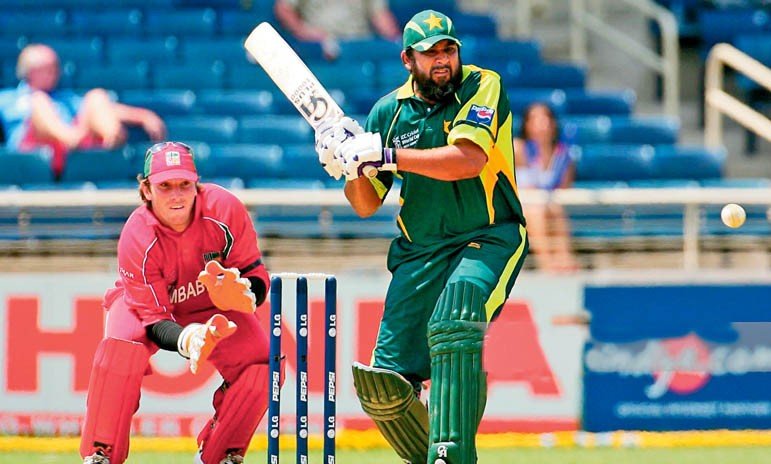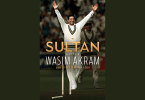‘Captain of the losers’ — Inzamam-ul-Haq — never scored a World Cup century in 33 inns
The Cricket World Cup is over and Pakistan couldn’t make it to the last four because of many reasons; one of them was the selection process that included Cricketers who were no good in World Cups.
Yes, I am talking about the very talented all-rounders Shoaib Malik and Mohammad Hafeez who is indomitable, but on paper. Out there, they performed like newbies who wanted to make a name for themselves at the expense of the team, and if there ever was a Worst World Cup XI, these two would be in it.
So why isn’t there a team comprising of cricketers who have performed poorly in the World Cups! It would be fun to compile a list of such Cricketers – some might have gone to lift the trophy, others could have failed because the opposition was stronger, their form deserted them and above all, they couldn’t handle the pressure at the biggest stage of all! So here goes …
Opening With The Worst Ever!
Despite being part of Pakistan’s international side for a number of years, three people stand out as opening batsmen you would never select ahead of a World Cup.
The first one that comes to mind is Imran Khan’s favorite Mansoor Akhtar, who never delivered when it was required. He was part of not one but two World Cups – 1983 and 1987 – and in his 8 innings, could only muster 108 runs at an average of 13.50 per innings.
Next in line is sometimes-a-bowler-sometimes-a-batsman Shahid Afridi who represented Pakistan in as many as 5 World Cups. He was a failure as a batsman in 1999, he was a failure as a batsman in 2015, and in all mega events in between, when he was batting that is. He played as many as 27 matches, batted in 24 innings (he chose to bat lower down the order when not in form) and scored a total of 325 runs at an average of 14.13 per outing. The self-proclaimed legend never scored a fifty in an ICC World Cup and was usually dropped as an opening batsman because of his inconsistency.
And then there was Ahmed Shehzad, another genius ODI batsman who should be the last person on your list if you want someone to bat for your life. He was part of 2011 and 2015 World Cups and out of his 12 innings, he could only muster the courage to score 271 runs with the help of two fifties and failed the rest of the times. His average may be slightly better than the other two in the list but 22.58 is still considered a bad average for an opening batsman that too in an era when his rivals were scoring heavily, and quickly. His performance was more like Fakhar Zaman in 2019 but while Fakhar has played one World Cup, Ahmed had two chances too many!
Ahmed Shehzad 12 matches, 271 runs, Highest Score 93, Average 22.58, 0 100, 2 50s,
Shahid Afridi 27 matches, 325 runs, Highest Score 37, Average 14.13, 0 100, 0 50
Mansoor Akhtar 8 matches, 108 runs, Highest Score 33, Average 13.50, 0 100, 0 50
The Real Undependable
Any team featuring Ijaz Ahmed, Younis Khan, and Shoaib Malik might be destined for greatness, if they were all in form at the same time, if they were all in the right frame of mind and if they were all playing to the best of their abilities.
Let’s take on Ijaz Ahmed first because he was usually the quickest of all three to get out; in his 29 World Cup matches from 1987 to 1999, he scored 516 runs at an average of 23.45, with the help of four fifties. He never went past 70 runs in the mega event which is sad considering he was part of the 1992 World Cup, and opened the innings in 1987 and was the regular number 3 nine years later.
Then, there is Younis Khan who would have shot himself in the head had he not been selected for the 2015 World Cup. In his 19 matches in the World Cup, he scored 349 runs at an average of 21.81, with 72 being his highest score.
And finally, there is the all-rounder of the century Shoaib Malik who played just 6 World Cup matches between 2007 and 2019, scored 100 runs in all at an average of 16.66 with the help of one innings of 62 runs, which was his only World Cup fifty. He was clueless in the last World Cup as a batsman and must be commended for not retiring from T20 international after his pathetic performance with the bat. And don’t talk to me about his bowling prowess where he took 2 wickets in six matches at an average of 40, which doesn’t even qualify him as an all-rounder. Even Mohammad Yousuf has dismissed a batsman in a World Cup and he hardly ever bowled in International Cricket!
Ijaz Ahmed 29 matches, 516 runs, Highest Score 70, Average 23.75, 0 100, 4 50s
Younis Khan 19 matches, 349 runs, Highest Score 72, Average 21.81, 0 100, 2 50s
Shoaib Malik 6 matches, 100 runs, Highest Score 62, Average 16.66, 0 100, 1 50
Captain Of the Losers!
And a team of losers should be led by the biggest loser of them all – Inzamam ul Haq. Currently, the former Chief Selector is infamous for inserting his ‘Romeo’ Nephew Imam ul Haq in the national side but back in the day, he was known as the King of Stupid dismissals, or you can call it Crazy Run Outs too.
In 1992, Jonty Rhodes ran him out to become a hero, in 1996 Inzi’s slow batting shifted the balance of the Quarter Final in India’s favor, in 1999 he tried to run out nearly everyone in the team with multiple incidents still fresh in everyone’s mind, while in 2003, the whole world knew that he wouldn’t score more than 19 runs in the entire tournament, even before the tournament began.
And finally, it was after the team’s loss to Ireland in 2007 – under the captaincy of you know who – that the coach Bob Woolmer lost his life because he took the shocking loss to his heart. Such an accomplished player should be the team’s captain, especially when he has scored just 717 runs in 35 matches at an unbelievably low average of 23.9 with the help of just four half-centuries in the mega event. He never scored a World Cup century in 33 innings and if that is not a bad performance, I don’t know what is!
Inzamam ul Haq 35 matches, 717 runs, Highest Score 81, Average 23.9, 0 100, 4 50s
The Worst Man behind the Wicket
There should never a doubt in anyone’s mind while selecting the worst Wicket Keeper to represent Pakistan in a World Cup. The honor must always go to Kamran Akmal who has set the bar so low that it is impossible to be worse than that. In both 2007 and 2011, he was the custodian of the stumps but he did everything right, except his job. Who can forget the two back-to-back missed chances of Ross Taylor off the bowling of Shoaib Akhtar in 2011 that ended the Rawalpindi Express career, but didn’t do anything bad for the Senior Akmal. In his 11 matches, he scored 249 runs at an average of 27.66 while took 17 dismissals in all, which were far less than those he dropped.
Kamran Akmal 11 matches, 249 runs, Highest Score 55, Average 27.66, 0 100, 1 50, 17 Dismissals
Electing The All-rounders
In modern-day cricket, you have to have Cricketers who can bowl and bat like a professional so that they can score runs when the chips are down, and take wickets when the regular bowlers can’t.
Sadly, we have accomplished Cricketers in the list who failed in the World Cups both as a batsman and a bowler, because they couldn’t handle the dual responsibility when they were expected to.
There is Mohammad Hafeez who played in three World Cup events between 2007 and 2019, and scored 483 runs at an average of 28.41 with the help of just two fifties; his bowling performance is a little better with 13 wickets in 18 matches but the average 33.53 isn’t ideal at all. There is also Abdur Razzaq and Mudassar Nazar who won many matches for Pakistan but one has 373 runs in 22 matches, the other has 149 runs in 12 matches. They both represented Pakistan in more than 3 World Cups and their bowling performance was better, with Razzaq taking 19 wickets in 22 matches, and Mudassar 8 in 12. However, they could have done better, considering they were match-winners in their own rights.
Mohammad Hafeez 18 matches, 483 runs, Batting Average 28.41, 13 wickets, Bowling Average 33.53
Abdul Razzaq 22 matches, 373 runs, Batting Average 21.94, 19 wickets, Bowling Average 31.15
Mudassar Nazar 12 matches, 149 runs, Batting
Average 16.55, 8 wickets, Bowling Average 49.62
And then there were the bowlers
The good thing about Pakistani bowlers is that they learn quickly and that’s why most of the bowlers who have played in more than one World Cup have done well. That’s why the worst of the lot that we shortlisted didn’t last more than one World Cup, and Iqbal Sikander tops the list. The only logic regarding his selection must be his name because he was chosen after veteran spinner Iqbal Qasim refused to go Down Under citing personal commitments; there was no need for Iqbal Sikander when another and a better leg spinner Mushtaq Ahmed was also in the side.
The newer Iqbal was dropped after 4 matches for he took 3 wickets at an average of 49 and gave away runs instead of restricting the batsmen. And as soon as he was dropped, Pakistan started winning and ended as Champions for the first and so far only time.
Then there was left-arm spinner Abdur Rehman who played 5 matches in 2011 and took 3 wickets at an average of 66.33. Who can forget Saleem Jaffer who very nearly played two World Cups (he was dropped from the 1992 World Cup final squad, after initial selection); the left-arm pacer took five wickets in as many matches but went for runs in the most crucial over of 1987 World Cup, and failed? His average of 42 runs per wicket seem to be angelic when compared with Hasan Ali’s 128 runs per wickets; the ICC Champions Trophy winner took just 2 wickets in his 4 overs in the recently concluded World Cup and went for as nearly 8 runs per over, which is too much by any standard. Not including him in the Worst World Cup Squad would have been an injustice to others selected!







